Marchés
Lors de la conception d’une intervention humanitaire et de la prise de décisions quant à l’utilisation des transferts monétaires, l’analyse générale des options de réponse doit inclure une analyse de marché. Il est prouvé qu’offrir un soutien ciblant le fonctionnement des marchés accélère la reprise et accroît la résilience dans les zones affectées par une catastrophe.
De nombreuses organisations ont investi dans la mise au point d’outils visant à faciliter l’analyse de marché et réfléchissent à la mise en place de programmes basés sur les marchés plus holistiques. Elles envisagent des interventions tirant profit du marché (basées notamment sur des transferts monétaires aux populations affectées), ainsi que des interventions soutenant directement les marchés (comme l’octroi de subventions conditionnelles aux vendeurs/euses pour la remise en condition du marché).
Initiatives associées
Contenu associé

1.2 Introduction à l’analyse de marché
Cours
Ce cours de 30 minutes offre une introduction à l’analyse de marché pour les contextes d’urgence. Il contient des contributions d'experts dans ce domaine. Ce cours a été développé en collaboration avec l'International Rescue Committee et le CALP Network et grâce au financement d’USAID/OFDA et de l’Agence Suisse pour le Développement et la Coopération. Il est destiné aux...

2.4 Un guide pratique pour l’analyse de marché
Cours
Ce cours en ligne de 3.5 heures vise à fournir aux équipes qui conduiront des analyses de marchés en contextes humanitaires une compréhension approfondie de la théorie et des étapes à suivre afin de leur permettre de comprendre le pourquoi et le comment du processus à suivre. Les participants seront guides à travers un scenario d'analyse de marchés d'urgence. Ce cours s'appuie sur...
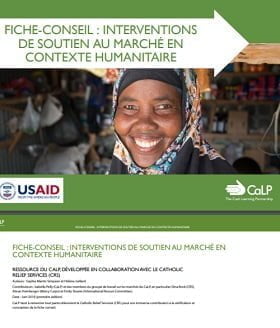
Fiche-Conseil : Interventions de soutien au marché en contexte humanitaire
Guides et outils
La fiche conseil définit le programme de soutien au marché en contexte humanitaire et le décrit dans la pratique. Elle permet aux praticiens humanitaires d’envisager systématiquement des interventions de soutien au marché, parallèlement à d’autres activités du programme. Le champ d’application comprend des interventions de soutien au marché axées sur l’offre/la disponibilité...
Thematic lead
Latest

Cash Transfer Programming: Feasibility and appropriateness in the context of IOCC´s humanitarian response to refugee and migrants´ crisis in Greece [Kos and Chios Island]
Report
This paper aims at assessing the feasibility and appropriateness of cash transfers programming (CTP) within the operational areas of International Orthodox Christian Charities (IOCC) and their humanitarian response activities to the refugees and migrants´crisis on the Greek Islands Chios and...
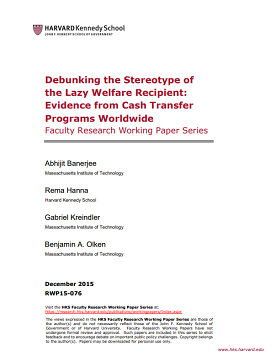
Debunking the Stereotype of the Lazy Welfare Recipient: Evidence from Cash Transfer Programs Worldwide
Report
Targeted transfer programs for poor citizens have become increasingly common in the developing world. Yet, a common concern among policy makers – both in developing as well as developed countries – is that such programs tend to discourage work. We re-analyze the data from 7 randomized controlled...
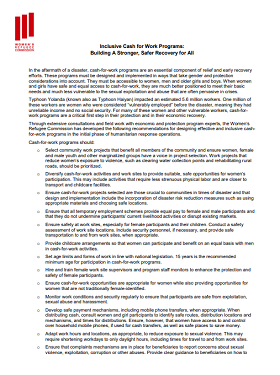
Inclusive Cash for Work Programs: Building A Stronger, Safer Recovery for All
Report
In the aftermath of a disaster, cash-for-work programs are an essential component of relief and early recovery efforts. These programs must be designed and implemented in ways that take gender and protection considerations into account. They must be accessible to women, men and older girls and boys. When...

Workshop Report – Cash Transfer Programming (CTP) in Northern Syria: Where are we now and where do we want to be?
Report
This report summarizes the outcomes of a one day workshop on Cash Transfer Programming (CTP) that was organized by the Cash-Based Responses Technical Working Group (CBR-TWG) for Northern Syria on April 28th 2015 in Gaziantep, Turkey. The workshop was attended by a wide group of stakeholders from the...
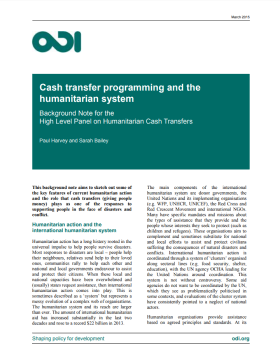
Cash Transfer Programming and the Humanitarian System
Policy paper
Cash transfer programming and the humanitarian system background note aims to sketch out some of the key features of current humanitarian action and the role that cash transfers play as one of the responses to supporting people in the face of disasters and conflict. Additionally, the publication...

Markets in Crises: South Sudan case study
Report
Not long after achieving independence, South Sudan descended into conflict, which has fuelled displacement and food insecurity.Although markets continue to function in the country, humanitarians have paid relatively little attention to market-based responses to the crisis. Looking primarily at Juba, this...

Overview: Rapid Assessment of Markets (RAM)
Report
The Rapid Assessment for Markets (RAM) provides a quick and basic snapshot of how key markets operate immediately after a shock, to support initial decision on feasibility of response options (cash vs in-kind, initial market support) and to identify whether or not more detailed market system analysis is...
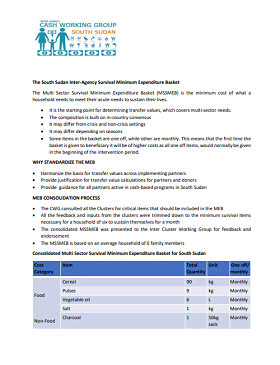
The South Sudan Inter-Agency Survival Minimum Expenditure Basket
Report
The Multi Sector Survival Minimum Expenditure Basket (MSSMEB) is the minimum cost of what a household needs to meet their acute needs to sustain their lives.
• It is the starting point for determining transfer values, which covers multi-sector needs.
• The composition is built on in-country consensus
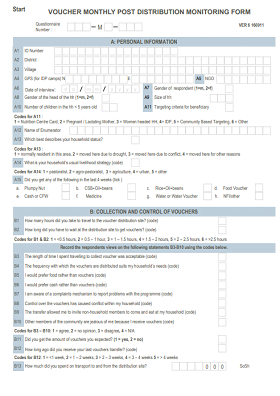
Voucher Monthly Post Distribution Form
Report

A Review of Evidence of Humanitarian Cash Transfer Programming in Urban Areas
Report
Urban poor populations frequently experience disasters of varying typology and intensity. When set against a backdrop of poverty and marginalisation, their needs can be complex. As recent urban crises have pushed humanitarian agencies to respond in urban areas, this literature review examines the...
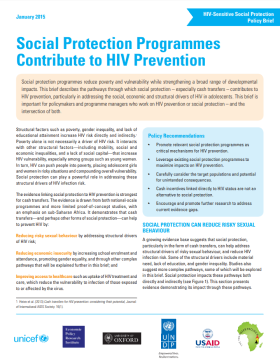
Social Protection Programmes Contribute to HIV Prevention
Policy paper
Social protection programmes reduce poverty and vulnerability while strengthening a broad range of developmental impacts. This brief describes the pathways through which social protection – especially cash transfers – contributes to HIV prevention, particularly in addressing the social, economic and...

Integrating Gender throughout a Project’s Life cycle 2.0: A Guidance Document for International Development Organisations and Practitioners
Guidelines and Tools
The overarching premise of this document is that to conduct effective, responsible development work, incorporating gender at all stages of a project’s life cycle – from project design and proposal development to field implementation and monitoring, evaluation and learning – is critical. As such,...
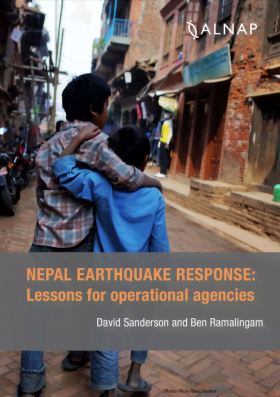
Nepal Earthquake Response: Lessons for operational agencies
Policy paper
In the aftermath of the April 2015 earthquake in Nepal, this paper looks at lessons drawn from previous comparable disasters and seeks to provide invaluable information and assistance to the operational agencies responding to the crisis. Seventeen Lessons give an overview of important learnings based on...

Documentation and Learning: Rapid emergency assistance to Typhoon Ruby (Hagupit) affected communities in the province of Samar, Philippines April 2015
Report
The documentation and learning study identifies good practices and lessons from the implementation of the Rapid Emergency Assistance to Typhoon Ruby (Hagupit) Affected Communities in the Province of Samar by Christian Aid (CA) and its local NGO partners – Coastal Core Incorporated (CCI), Center for...

Report from the Inaugural Markets and WaSH Learning Event
Report
This report summarizes the presentations and discussions that took place during a learning event on market-based programming targeting key humanitarian stakeholders in the WaSH sector. Held on October 13, 2015 at the IFRC office in Nairobi, the event was organized under the umbrella of the Markets in...

Tigo Cash Senegal
Guides et outils
Mobile Cash S.A (“MCSA”) was created in 2012 as a subsidiary of the Millicom group, it obtained its EME license from bceao following the decision of February 13, 2014 under the number “EME. SN 005/2013. Mobile Cash S.A. is therefore authorized to issue and distribute electronic money to a clientele...

Part 1.4 Protection Risk and Benefits Analysis
Report
All humanitarian interventions carry risks, even in-kind delivery of goods and services. Cash programming is no exception. Specific areas of risk include:
Safety and dignity.
Humanitarian access to crisis-affected populations.
Crisis-affected populations’ access to aid.
Data protection and beneficiary...

Livelihoods Toolbox
Guidelines and Tools
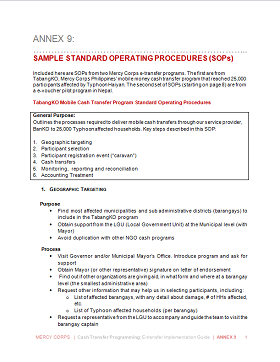
Annex 9: Sample Standard Operating Procedures (SOPs)
Report
Included here are SOPs from two Mercy Corps e-transfer programs. The first are from TabangKO, Mercy Corps Philippines’ mobile money cash transfer program that reached 25,000 participants affected by Typhoon Haiyan. The second set of SOPs (starting on page 8) are from a e-voucher pilot program in Nepal.
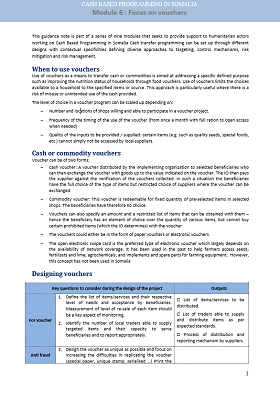
Cash Based Programming In Somalia – Module 6: Focus On Vouchers
Report
This guidance note is part of a series of nine modules that seeks to provide support to humanitarian actors working on Cash Based Programming in Somalia Cash transfer programming can be set up through different designs with contextual specificities defining diverse approaches to targeting, control...
